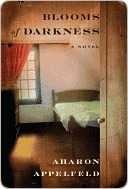
Blooms of Darkness
A Novel
کتاب های مرتبط
- اطلاعات
- نقد و بررسی
- دیدگاه کاربران
نقد و بررسی

January 4, 2010
In this powerful novel from award-winning Israeli writer Appelfeld, two discarded souls form an unlikely bond in the chaos of occupied Ukraine during WWII. When the Jews are being rounded up, 11-year-old Hugo’s mother hides him with her childhood friend, Mariana, a prostitute in a brothel. Locked in a closet every night, Hugo hears Mariana at work and disappears into dreams and visions about his family and friends. Mariana takes loving if sporadic care of Hugo and slowly she becomes Hugo’s whole world. Hugo returns Mariana’s kindness by lifting her spirits as her moods swing from frivolity and disregard for the destruction around her to deep depression about the indignities she endures. Mariana is an exhilarating tragicomic heroine, a woman who is both alcoholic, manic-depressive, and believer in a God she long ago abandoned. The lean, spare prose does not shy away from harsh realities. A simple story that encapsulates the joy and sadness of a coming-of-age novel with the trauma of a world in the midst of destruction.

February 15, 2010
An unadorned and heartbreaking tale of a young boy coming of age during World War II.
Appelfeld (Laish, 2009, etc.) introduces us to Hugo Mansfeld, who is just about to turn 11 and who, without being aware of it, is more on the cusp of adulthood than of adolescence. Life in the ghetto has recently become unbearably tense and stressful. Hugo's father, a pharmacist, has been taken to a labor camp, and his mother is desperately looking for somewhere safe to place her son, perhaps in a local village near the Carpathian Mountains. After several plans fall through because some possible rescuers have been transported to camps by the German authorities, Hugo's mother places her son with Mariana, an old childhood friend who's"fallen low." Hugo quickly learns he is not allowed to go outside and must spend his nights in the closet of Mariana's sumptuous bedroom. A quiet child who at first likes to spend his time playing chess and reading, Hugo is also sensitive, reflective and almost comically polite. It turns out that Mariana is a prostitute, and the place where she lives, The Residence, is a brothel, but for a while Mariana succeeds in keeping Hugo's whereabouts a secret. Eventually, in her loneliness and alcoholic wooziness, she innocently takes Hugo to her bed for solace and companionship. He loves being comforted in Mariana's warm embrace, but as life in this Ukrainian village comes under increasing threat from retreating Germans and advancing Russians, they become lovers. After Hugo has been with Mariana for over a year, the Residence closes down altogether, and they travel the sparse countryside, trying to pass themselves off as mother and son. In time, however, Mariana is caught, and the Russians don't take kindly to women who have consorted with Germans. Throughout their harrowing ordeal Mariana tries to hold on to some semblance of faith in a God she feels she has abandoned—or vice versa.
Poignant and tender without being sentimental, the novel achieves its powerful emotive effects through simplicity and understatement—a beautiful read.
(COPYRIGHT (2010) KIRKUS REVIEWS/NIELSEN BUSINESS MEDIA, INC. ALL RIGHTS RESERVED.)

Starred review from April 1, 2010
As the Nazis move in to liquidate the ghetto where his family lives, 11-year-old Hugo and his mother flee. She leaves him with her childhood friend Marianna, now a prostitute, who has promised to hide the boy. During his days at the brothel, Hugo must stay mostly in a closet, where he listens to the conversations among the prostitutes or the sometimes harsh words of Marianna's customers as they rebuke her for not complying with their demands. When Marianna's self-pity is not fueled with alcohol, she treats Hugo affectionately, vowing to protect him at all costs. Slowly, Hugo forgets his family and friends and falls in love with Marianna; she cunningly abandons herself to him, introducing him to the pleasures of sex. When the Red Army begins its approach, the two flee the brothel, and through a heartbreaking series of events, Hugo finds himself bereft of love and truly alone in a world where the only hope for understanding and redemption is in a community cobbled from the remnants of his old life. VERDICT This latest from Israeli novelist Appelfeld joins classics such as Elie Wiesel's "Night"in depicting the struggles of a young man to come to terms with the loneliness and despair of a world falling apart.Henry L. Carrigan Jr., Evanston, IL
Copyright 2010 Library Journal, LLC Used with permission.

March 15, 2010
The latest from acclaimed Israeli novelist Appelfeld is a haunting tale of love, loss, and the resilience of the human spirit. When the Nazis begin to infiltrate the ghetto where 11-year-old Hugo lives, his mother has no choice but to leave him with her childhood friend Mariana, a prostitute in the local brothel. During the day Hugo is confined to Marianas room, and at night he must stay silent, locked in her closet. As he listens to Mariana and the Nazi soldiers who visit, he clings to the fading memories of his family. Though Mariana is an alcoholic, prone to mood swings and abrupt disappearances, she is fiercely protective of Hugo and attentive to his needs. And as Hugo begins to come of age, he becomes more and more attached to Mariana, with an increasing desire to act as her caregiver and protector. When the prostitutes suddenly depart the brothel after the arrival of the Russian army, the two have no choice but to flee themselves, leading to a conclusion both grim and elegantly hopeful.(Reprinted with permission of Booklist, copyright 2010, American Library Association.)

























دیدگاه کاربران